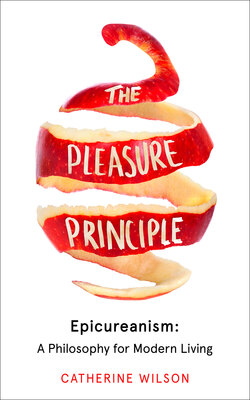Читать книгу The Pleasure Principle - Catherine Wilson - Страница 11
Atomism: Three Consequences
ОглавлениеThe Epicureans drew several important consequences from their views about the nature of reality. The world of familiar objects – tables, chairs, plants and animals, puddles and ponds – its colours, scents and sounds, they realised, is an appearance. And although everything except the atom is perishable, some things are more stable and can endure longer than others. Organisms and boulders are stable by comparison with soap bubbles or houses of cards.
Taking this perspective on board, we realise that the perception of what we call reality depends on the observer, who is nothing but an aggregate of atoms (or their modern equivalent). Human beings are similar enough in our constitutions that we can all perceive tables and chairs, plants and animals, airplanes overhead, sails in the distance, red and green traffic lights, when they are a suitable distance away and our eyes are working normally. And human bodies are different enough from one another that we disagree about what dishes, colour combinations and perfumes are appealing. But the visual world of an eagle or a panther, the odiferous world of a dog, or that of a lizard that can smell carrion several miles away, must be different from ours, insofar as their bodies and sensory organs are composed of differently put-together particles. We should beware of supposing that human perception sets any kind of standard, as though other animals enjoy enhanced or suffer from defective versions of our perceptual abilities.
Individual differences can be strongly marked when it comes to the values – positive or negative – we ‘see’ in objects, situations and events, or feel ‘belong’ to them. We believe that strawberries are truly red and truly delicious when ripe, and that premeditated murder for financial gain is truly wrong. But we can only make such confident judgements because certain arrangements of particles, those composing strawberries or making up the pixels on a television screen at a certain time or the print in a newspaper article, make more or less the same impact on different human sensory systems and minds.
When we disagree in our perceptions or our moral judgements, the reason for this is not hard to fathom. We are similar but not identical, and the world presents itself a little differently to everyone. Please don’t jump to the conclusion, however, that an Epicurean must be a relativist who thinks everyone’s judgement is as good as everyone else’s when it comes to questions of taste or morality. The actual Epicurean position on the issue of relativism is far subtler.
To return to the theme of atomic reality, the realisation that everything is fragile and tends with time to get broken up points us in two directions. First, we should not be surprised that our wine glasses break, our houses crumble, stock market runs come to an end and our relationships go awry. Forewarned is forearmed. At the same time, we can appreciate that some objects and situations are more likely to hold up over time, either because, like boulders, they are large, hard and resistant, or because, like the soft human body and like some relationships, they can repair themselves ‘from within’.
The Epicurean recognises that the tendency to fall apart is built into the nature of things. Aware that this is so, she preserves, repairs and restores where this is in her power, and accepts the inevitable when it is not. Further, she recognises that the future is genuinely open and unpredictable. We do not know what combinations will come along or what accidental ‘swerves’ will upset a delicate balance and make for sudden reversals. The Epicurean expects the future to be predictable and stable where experience and science have shown it to be so, but she is always prepared for surprises.
